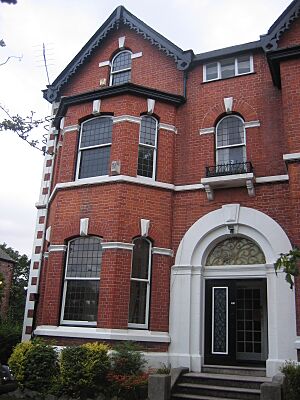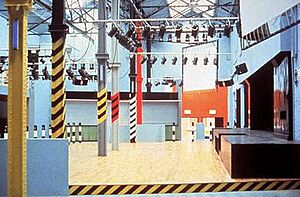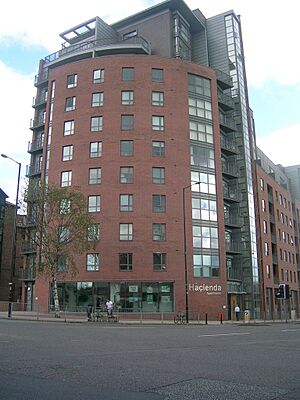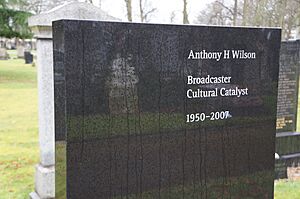Factory Records facts for kids
Quick facts for kids Factory Records |
|
|---|---|
 |
|
| Founded | 1978 |
| Founder |
|
| Defunct | 1992 |
| Status | Defunct |
| Distributor(s) | Pinnacle Distribution (in the UK) Warner Records (in the US) WEA International (worldwide) Rhino Entertainment (Reissues) Virgin Music Label & Artist Services (select) |
| Genre | Post-punk, alternative dance |
| Country of origin | United Kingdom |
| Location | Manchester |
Factory Records was a cool music company from Manchester, UK. It was started in 1978 by Tony Wilson and Alan Erasmus.
This company helped launch many famous bands. Some of these included Joy Division, New Order, Happy Mondays, and A Certain Ratio. Factory Records also owned The Haçienda, a famous nightclub, with the band New Order.
Factory Records was known for its unique style. This was thanks to a creative team, especially music producer Martin Hannett and designer Peter Saville. They gave the label and its artists a special sound and look. The company even had a special way of numbering everything. Not just music, but also posters, films, and even people!
Contents
The Story of Factory Records
How Factory Records Started
The name "The Factory" first appeared in May 1978 for a club night. This club became very famous in Manchester. It was known by different names, like the Russell Club. The "Factory" nights were started by Alan Erasmus and Tony Wilson. They were helped by a promoter named Alan Wise.
The club hosted many touring bands and new post-punk groups. Local bands like the Durutti Column and Joy Division also played there. The original club building was taken down in 2001.
Peter Saville designed ads for the club. In September 1978, Factory released its first music. It was an EP (a short album) called A Factory Sample. It featured music from bands that played at the club.
Early Years: 1978 and 1979
After the successful club nights, Factory Records officially released "A Factory Sample" in January 1979. Tony Wilson, Rob Gretton, and Alan Erasmus decided to create Factory Records. They were joined by Martin Hannett, who had worked with another punk label.
In 1978, Tony Wilson hosted a new wave music event at the Deeply Vale Festival. This event featured early performances by bands like the Durutti Column and the Fall.

The first Factory Records office was in Alan Erasmus's home. The Factory Sample EP came out on December 24, 1978. After that, singles were released by A Certain Ratio and Orchestral Manoeuvres in the Dark. The first full album from Factory was Joy Division's Unknown Pleasures, released in June 1979.
The 1980s: Growth and Challenges
In January 1980, The Return of the Durutti Column was released. This was the first of many albums by guitarist Vini Reilly. In May, Ian Curtis, the singer for Joy Division, passed away. This happened just before the band was supposed to tour the US.
The next month, Joy Division's song "Love Will Tear Us Apart" became a top 20 hit in the UK. Their second album Closer came out soon after. In late 1980, the remaining members of Joy Division formed a new band called New Order. Factory Records also started to expand, with new labels like Factory Benelux in Europe and Factory US in America.
In 1981, Factory and New Order decided to open a nightclub. They started to turn an old textile factory in Manchester into the club. Martin Hannett left the label around this time. He wanted to open a recording studio instead. He later had a disagreement about money with Factory, which was resolved in 1984. Peter Saville also left as a partner due to payment issues, but he kept working for Factory.
The Haçienda (known as FAC 51) opened in May 1982. Even though many people went there and loved its design, the club lost a lot of money. This was because the entry fees and drinks were very cheap. The Haçienda ended up costing the company thousands of pounds every month.
In 1983, New Order's song "Blue Monday" (FAC 73) became a huge international hit. However, Factory Records didn't make any money from it. The record's special cover, designed to look like a floppy disk, was so expensive to make that the label lost money on each copy sold.
The band Happy Mondays released their first music in 1985. New Order and Happy Mondays became the most successful bands on the label. They helped fund many other projects. Factory Records and The Haçienda became central to the "Madchester" music scene. This scene mixed techno and acid house with post-punk guitar music. Factory also opened a bar (The Dry Bar) and a shop (The Area) in Manchester.
The 1990s: Challenges and Closure
Factory's main office (FAC 251) opened in September 1990 in Manchester.
By 1992, the label faced big money problems. This was partly because two of its main bands, Happy Mondays and New Order, were spending a lot on recording their new albums. Another music company, London Records, was interested in buying Factory. But the deal fell apart. It turned out that because Factory didn't use formal contracts early on, New Order owned their older music, not the label.
Factory Communications Ltd, the company formed in 1981, went out of business in November 1992. Many bands that used to be with Factory, including New Order, then joined London Records.
The Haçienda club closed in 1997 and was torn down soon after. A modern apartment building, also called The Haçienda, was built there in 2003. In 2009, Peter Hook (from New Order) wrote a book about his time owning the Haçienda.
The 2000s and Beyond
The 2002 film 24 Hour Party People tells the story of Factory Records and The Haçienda. Many people involved with Factory, including Tony Wilson, had small roles in the movie. The main character, based on Wilson, was played by actor Steve Coogan.
Anthony Wilson, the founder of Factory Records, passed away on August 10, 2007, at age 57.
Colin Sharp, a singer for the Durutti Column in 1978, passed away on September 7, 2009. A few months later, Larry Cassidy, the bassist and singer for Section 25, passed away on February 27, 2010.
In early 2010, Peter Hook helped renovate and reopen the old Factory Records headquarters (FAC 251) as a nightclub. It's still called FAC 251, but people often call it "Factory." It hosts DJs and live bands every week.
In May 2010, James Nice published a book called Shadowplayers. This book tells the story of Factory Records and gives details about many important people involved with the label.
The Unique FAC Numbers
Factory Records had a very special way of naming its releases and other items. Everything got a catalogue number, usually starting with FAC or FACT. FACT was used for full-length albums. FAC was used for singles and many other things related to Factory.
For example:
- A club night advertisement was FAC 1.
- The Haçienda nightclub was FAC 51.
- A lawsuit against Factory Records was FAC 61.
- A hairdressing salon was FAC 98.
- Even Tony Wilson's coffin received a Factory catalogue number: FAC 501!
The numbers were not given out in exact order. Numbers for Joy Division and New Order releases often ended in 3, 5, or 0. A Certain Ratio and Happy Mondays releases often ended in 2. The Durutti Column's releases often ended in 4.
Even after Factory Records closed in 1992, the numbering system continued. The 24 Hour Party People film was FAC 401, and its DVD release was FACDVD 424.
Factory Classical Music
In 1989, Factory Records started a special series called Factory Classical. This series released classical music albums. It featured composers like Steve Martland and Benjamin Britten. It also included performances by groups like the Kreisler String Orchestra. These releases continued until 1992.
Later Versions of Factory Records
In 1994, Tony Wilson tried to restart Factory Records. He worked with London Records and called it "Factory Too." The first release was by the Durutti Column. Other bands on this label included Hopper. This label was active until the late 1990s. "Factory Once" was another part that re-released old Factory music.
Wilson also started a short-lived fourth version called F4 Records in the early 2000s.
In 2012, Peter Saville and James Nice formed a new company called Factory Records Ltd. They worked with Alan Erasmus and Tony Wilson's son, Oliver Wilson. This company only re-released one vinyl album. Later, James Nice brought back the Factory Benelux name for reissues and new music from Factory-related bands. In 2019, Warner Music Group celebrated Factory's 40th anniversary with a website and special vinyl releases.
Main Factory Records Artists
The bands with the most releases on Factory Records were Joy Division/New Order, Happy Mondays, Durutti Column, and A Certain Ratio. Each of these bands had many different releases with their own FAC numbers.
Looking Back at Factory Records
An exhibition called FACTVM celebrated 20 years since Factory Records closed. It showed Colin Gibbins' collection of items from the label. This exhibition took place in Manchester in May 2012.
In October 2019, a new box set was released. It contained rare songs and music from the label's first two years.
From June 2021 to January 2022, Manchester's Science and Industry Museum hosted an exhibition. It was called 'Use Hearing Protection: The early years of Factory Records'. It showed graphic designs by Peter Saville and items from the Factory archives. It also included objects loaned from the families of Tony Wilson and Rob Gretton.
Images for kids
 | Laphonza Butler |
 | Daisy Bates |
 | Elizabeth Piper Ensley |









